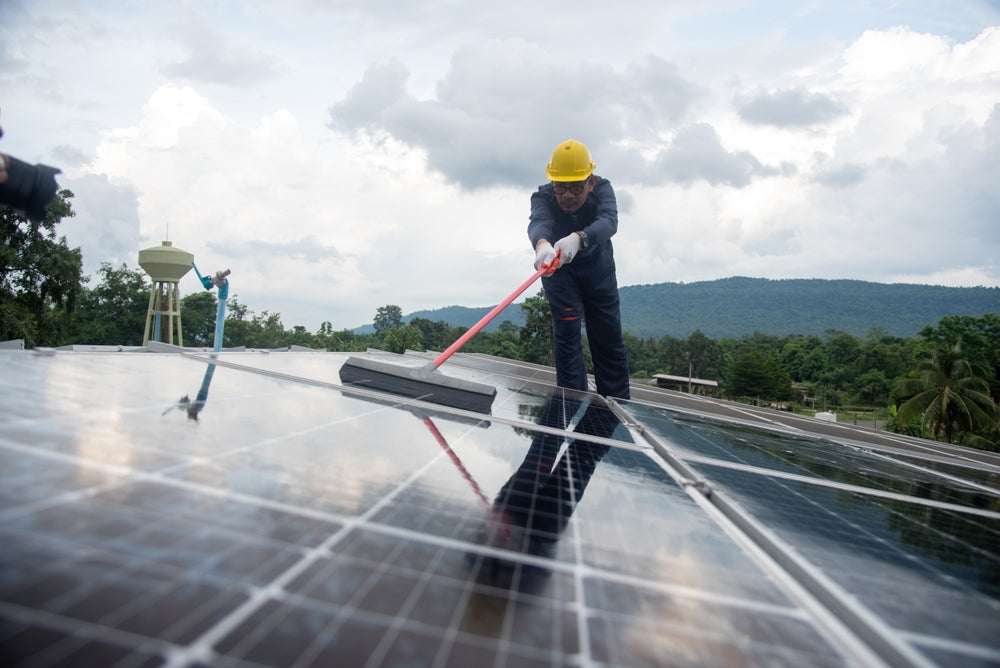
Solar energy is an efficient and environmentally friendly power source that helps reduce electricity costs and contribute to a sustainable future. However, for solar panels to perform at their best, it’s essential to keep them clean and free from dirt and debris.
In this blog, we will discuss solar panel cleaning methods and the importance of keeping your solar panels clean to ensure they continue functioning optimally.
Power House: A Leading Pakistani Brand
Before diving into the details of solar panel cleaning, it’s essential to introduce Power House, a reputable Pakistani brand known for its innovative solar energy solutions. Power House provides top-notch solar panels and solar systems designed to meet the energy needs of homes and businesses across Pakistan.
With a commitment to quality and efficiency, Power House ensures that their solar panels are built to last, delivering excellent performance and reliability. But like any other solar panels, Power House products also need regular solar panel cleaning to maintain their efficiency and output.
Now, let’s explore the process of cleaning solar panels and how it can enhance their performance.
Why is Solar Panel Cleaning Important?
Solar panels are installed outdoors, where they are exposed to various environmental factors like dust, dirt, bird droppings, and pollution. Over time, these elements can accumulate on the surface of the panels, creating a layer that reduces their ability to absorb sunlight effectively. This buildup can lower the panels' energy production, leading to reduced efficiency.
Regular solar panel cleaning helps to remove this debris, allowing the panels to capture sunlight more efficiently. By maintaining clean solar panels, you can ensure maximum energy output, which translates to lower electricity bills and better performance.
How Often Should You Clean Your Solar Panels?
The frequency of solar panel cleaning depends on several factors, including your location, weather conditions, and the level of dust or pollution in your area. In areas with high dust levels, frequent bird activity, or pollution, you may need to clean your panels more often. A general recommendation is to clean solar panels every 6 to 12 months. However, if you notice a significant drop in your system's performance, it’s a good idea to check if the panels are dirty and in need of cleaning.
Best Time for Solar Panel Cleaning
The best time for solar panel cleaning is either early in the morning or late in the evening when the sun is not at its peak. This ensures that the panels are cooler, reducing the risk of thermal shock, which can occur when cold water is applied to hot panels. Additionally, cleaning during these times prevents water from evaporating quickly, which can leave streaks or water spots on the panels.
Step-by-Step Guide to Solar Panel Cleaning
Here’s a step-by-step guide to help you clean your solar panels effectively:
1. Safety First
Before you start cleaning, safety should be your priority. Solar panels are usually installed on rooftops, so you’ll need to be careful when climbing ladders or accessing the roof. Make sure you wear appropriate safety gear, such as non-slip shoes and a harness, if necessary. If you’re not comfortable with heights or don’t have the proper safety equipment, it’s best to hire a professional solar panel cleaning service.
2. Turn Off the Solar System
Before cleaning, always turn off the solar panel system to avoid any risk of electric shock. You can usually do this by flipping the switch on the inverter or following the shutdown procedure outlined in your system’s manual.
3. Use the Right Tools
For solar panel cleaning, you don’t need any special equipment. Here are the basic tools you’ll need:
- A soft brush or sponge
- A bucket of clean water
- A squeegee with a long handle
- A garden hose (optional)
Avoid using harsh chemicals, abrasive materials, or pressure washers, as they can damage the surface of the panels.
4. Gently Remove Dust and Dirt
Start by gently brushing or wiping away any loose dust, dirt, or leaves from the panels. This will make it easier to clean the surface without creating scratches. If your panels are installed at an angle, you can use a garden hose to rinse them off, but be sure to use a gentle stream of water.
5. Clean the Panels with Water
Fill a bucket with clean water and dip a soft sponge or brush into the water. Gently scrub the surface of the solar panels to remove any dirt, grime, or bird droppings. It’s essential to use a soft brush to prevent scratching the panels. If you encounter stubborn spots, you can use a mild soap solution, but make sure to rinse the panels thoroughly with water to remove any soap residue.
6. Rinse the Panels
After scrubbing the panels, use a garden hose or a bucket of clean water to rinse away any remaining dirt and soap. Ensure that all soap is removed, as soap residue can reduce the efficiency of the panels.
7. Dry the Panels
To prevent water spots or streaks, use a squeegee with a long handle to dry the panels. Start from the top of the panel and work your way down, ensuring that no water is left behind. If you don’t have a squeegee, you can let the panels air dry, but be aware that this might leave some spots, especially if the water contains minerals.
8. Inspect the Panels
Once the solar panel cleaning is complete, inspect the panels for any damage or issues. Check for cracks, chips, or loose connections that may need to be addressed by a professional technician. Keeping an eye on the condition of your panels ensures that they remain in good working order.
Tips for Effective Solar Panel Cleaning
Here are a few additional tips to keep in mind when cleaning your solar panels:
- Use soft water: If possible, use distilled or filtered water to clean your panels, as hard water can leave mineral deposits that may reduce efficiency.
- Avoid cleaning on sunny days: As mentioned earlier, it’s best to clean panels when the sun is not at its peak to prevent water from evaporating too quickly.
- Monitor performance: After cleaning your panels, monitor your system’s performance to see if there is an improvement in energy production. This can help you determine how often you need to clean your panels.
Solar Panel Cleaning: DIY vs. Professional Services
While DIY solar panel cleaning can be a cost-effective option, hiring a professional service has its advantages. Professionals have the experience and equipment to clean panels safely and efficiently, especially in hard-to-reach areas. They can also inspect your panels for any damage or potential issues that may need attention.
If you have a large solar array or are uncomfortable with heights, it’s worth considering professional solar panel cleaning services to ensure the job is done correctly.
Common Mistakes to Avoid During Solar Panel Cleaning
To avoid damaging your panels or reducing their efficiency, here are some common mistakes to steer clear of during solar panel cleaning:
- Using harsh chemicals: Avoid using bleach, ammonia, or other harsh cleaning agents that can damage the surface of the panels.
- Scrubbing too hard: Be gentle when cleaning to prevent scratching the panels. Always use a soft brush or sponge.
- Ignoring safety precautions: Cleaning panels on rooftops can be dangerous. Always prioritize safety and consider hiring a professional if you’re not confident in doing it yourself.








